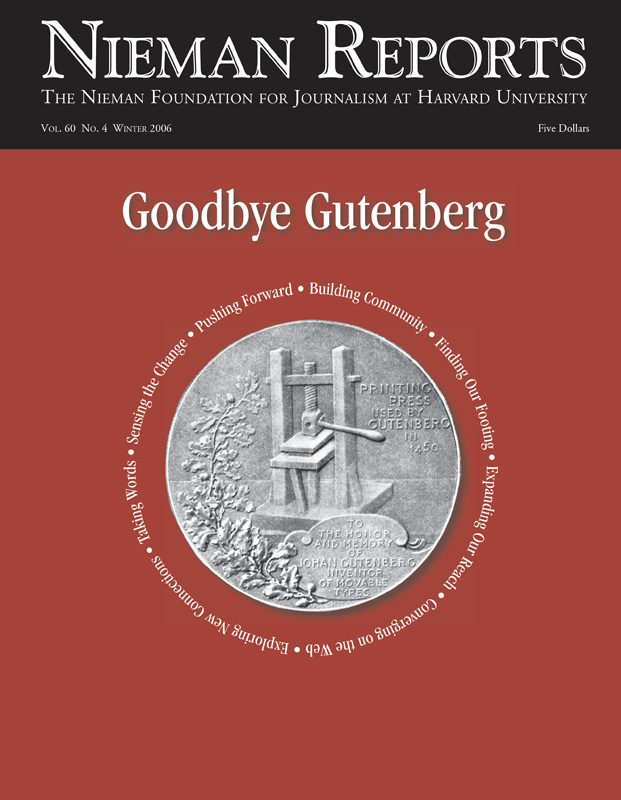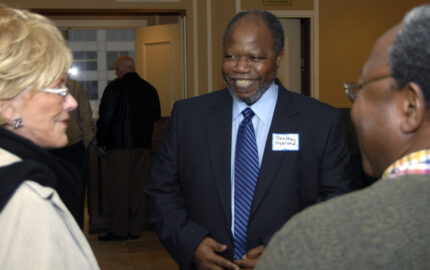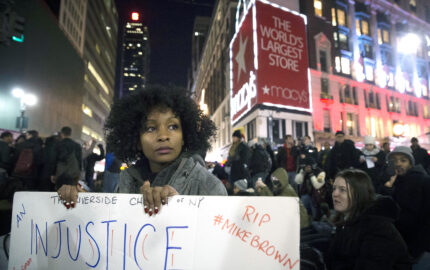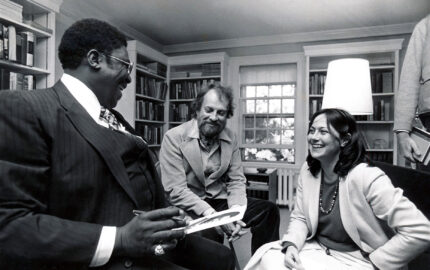When I left The Associated Press (AP) to join the Battle Creek Enquirer in 1971, a colleague warned that editing a newspaper would prove far different from working for a nonprofit organization such as AP. "Your worst enemy will be the advertising director," said Max McCrohon, managing editor of the Chicago Tribune. "He'll sell your children into slavery if you don't watch out."
Jack Newman, the Enquirer's genial advertising director, was an unlikely choice for an enemy, and in fact he became a good friend. Even so, the years have convinced me that McCrohon was a prophet for then, as now, editors and advertisers were locked in a struggle for the body and the soul of newspapers.
Jack's responsibility was to please advertisers, while mine was to meet what I perceived as the needs of readers. Sometimes we skirmished over what attention should be paid to an advertising client, or whether certain space in the paper should carry advertising or news. When we disagreed, the matter was settled by Publisher Bob Miller, whose father had founded the Enquirer. Bob often ruled in Jack's favor, but on matters of principle he usually found for my side. Deeply involved in community affairs, he required only modest profits from the newspaper's operation.
In July 1971, Bob sold the Enquirer to the Gannett Company, along with newspapers he owned in Lansing and Port Huron, Michigan; Boise, Idaho, and Olympia and Bellingham, Washington. Under the new owners, Newman won more arguments and the newsroom came under tighter restraint. Whereas the Enquirer had received news and photos from AP and United Press as well as The New York Times News Service, budget pressures required me to discontinue all but AP. Readers accustomed to the journalistic equivalent of soup, salad and dessert were served only meat and potatoes.
In October 1971, the Gannett executive committee visited Battle Creek, and a somewhat apprehensive Bob Miller asked me to join him at the meeting. The first question by Gannett Chairman Paul Miller (no relation to Bob) was "Well, how are things going?"
Somewhat nervously, Bob replied, "I think you are cutting us too close and taking too much out of Battle Creek."
"You do," said Paul Miller, appearing surprised. "Well, I'll look into that."
I don't know where Paul Miller looked, but pressure on the news department grew tighter in the years that followed. Pages were reduced in size and number, and some jobs were eliminated. The Enquirer's circulation declined, but its profit margin increased.
Bob Miller, Jr., was publisher of The Idaho Statesman in Boise, and on a visit to Battle Creek he said too much was also being taken out of that newspaper. "Somebody's got to stand up to those bastards," he told me.
That someone had to stand up for news against advertising was a cry heard at many newspapers in the years that followed. Time and again, editors answered the call, but almost without exception their rebellions failed and the editors lost their jobs. At some newspapers, editors chose to resign in protest of newsroom budget reductions.
There was, however, a lucrative alternative: By joining, rather than standing up against slashing of newsroom budgets, editors could not only protect their jobs but share in profits to be made under the new style of management. Often they acquired stock options in public-owned corporations such as Gannett.
Like many other editors, I accepted stock options, and watched my salary grow far beyond my earlier expectations at AP. This followed a pattern in which many editors joined operating committees that answered to investors no less, and perhaps more, than to readers. Many newspapers earned profit margins of 25 percent or more, well above the average of Fortune 500 top companies.
In recent years the Internet has taken advertising that traditionally went to newspapers, and publishers, more likely to be corporate executives than community patriarchs, offset the loss of income by further reductions in newsroom budgets. Inevitably, the depth and quality of most newspapers were affected. Front pages once sacrosanct to news began to carry advertisements, and some papers dropped weekend editorial pages. Sunday comics that once offered magical art to attract young readers became a jammed hodge-podge in which dialogue and action were often hard to follow.
Faced with toughened competition for attention, newspapers chose not to improve their product, but to cut and run. Not surprisingly, a study by Washington University found in that in 2005 just over 50 percent of Americans were reading newspapers, compared to 77 percent in 1977.
"Who Killed the Newspaper?" asked a recent issue of The Economist. I believe the newspaper was not killed but acquired by owners concerned more with profits than public service. Its potential for building and binding communities remains, but like the golden goose it has been weakened by demand for more eggs.
Can the newspaper regain its place in American society? I believe the answer is yes. While the Web provides unlimited detail for the dedicated seeker of information, the average consumer still finds more depth and durability in newspapers than in electronic news sources. "Look at this" or "read this" permits a sharing of experience far superior to being shown what has been found on a computer screen.
The question is not whether the newspaper is dead, but whether it can be rescued from unreasonable demands. For modest profit, perhaps less than was earned by the Battle Creek Enquirer under Bob Miller, it can reclaim its role in community affairs and perhaps build a better-informed nation by luring readers back from the shallow waters of television news.
First, however, the enemy must be identified and, as Max McCrohon suggested, the place to look is the advertising department, where the demands of investors are made known.
Watson Sims, a 1953 Nieman Fellow, left stock options on the table in departing Battle Creek to become editor of The New Brunswick (N.J.) Home News in 1978. He retired in 1986, and one year later the Boyd family, which had owned the Home News for more than 100 years, sold the newspaper to Gannett. Sims later directed media studies for The George H. Gallup International Institute in the United States and Eastern Europe.
Jack Newman, the Enquirer's genial advertising director, was an unlikely choice for an enemy, and in fact he became a good friend. Even so, the years have convinced me that McCrohon was a prophet for then, as now, editors and advertisers were locked in a struggle for the body and the soul of newspapers.
Jack's responsibility was to please advertisers, while mine was to meet what I perceived as the needs of readers. Sometimes we skirmished over what attention should be paid to an advertising client, or whether certain space in the paper should carry advertising or news. When we disagreed, the matter was settled by Publisher Bob Miller, whose father had founded the Enquirer. Bob often ruled in Jack's favor, but on matters of principle he usually found for my side. Deeply involved in community affairs, he required only modest profits from the newspaper's operation.
In July 1971, Bob sold the Enquirer to the Gannett Company, along with newspapers he owned in Lansing and Port Huron, Michigan; Boise, Idaho, and Olympia and Bellingham, Washington. Under the new owners, Newman won more arguments and the newsroom came under tighter restraint. Whereas the Enquirer had received news and photos from AP and United Press as well as The New York Times News Service, budget pressures required me to discontinue all but AP. Readers accustomed to the journalistic equivalent of soup, salad and dessert were served only meat and potatoes.
In October 1971, the Gannett executive committee visited Battle Creek, and a somewhat apprehensive Bob Miller asked me to join him at the meeting. The first question by Gannett Chairman Paul Miller (no relation to Bob) was "Well, how are things going?"
Somewhat nervously, Bob replied, "I think you are cutting us too close and taking too much out of Battle Creek."
"You do," said Paul Miller, appearing surprised. "Well, I'll look into that."
I don't know where Paul Miller looked, but pressure on the news department grew tighter in the years that followed. Pages were reduced in size and number, and some jobs were eliminated. The Enquirer's circulation declined, but its profit margin increased.
Bob Miller, Jr., was publisher of The Idaho Statesman in Boise, and on a visit to Battle Creek he said too much was also being taken out of that newspaper. "Somebody's got to stand up to those bastards," he told me.
That someone had to stand up for news against advertising was a cry heard at many newspapers in the years that followed. Time and again, editors answered the call, but almost without exception their rebellions failed and the editors lost their jobs. At some newspapers, editors chose to resign in protest of newsroom budget reductions.
There was, however, a lucrative alternative: By joining, rather than standing up against slashing of newsroom budgets, editors could not only protect their jobs but share in profits to be made under the new style of management. Often they acquired stock options in public-owned corporations such as Gannett.
Like many other editors, I accepted stock options, and watched my salary grow far beyond my earlier expectations at AP. This followed a pattern in which many editors joined operating committees that answered to investors no less, and perhaps more, than to readers. Many newspapers earned profit margins of 25 percent or more, well above the average of Fortune 500 top companies.
In recent years the Internet has taken advertising that traditionally went to newspapers, and publishers, more likely to be corporate executives than community patriarchs, offset the loss of income by further reductions in newsroom budgets. Inevitably, the depth and quality of most newspapers were affected. Front pages once sacrosanct to news began to carry advertisements, and some papers dropped weekend editorial pages. Sunday comics that once offered magical art to attract young readers became a jammed hodge-podge in which dialogue and action were often hard to follow.
Faced with toughened competition for attention, newspapers chose not to improve their product, but to cut and run. Not surprisingly, a study by Washington University found in that in 2005 just over 50 percent of Americans were reading newspapers, compared to 77 percent in 1977.
"Who Killed the Newspaper?" asked a recent issue of The Economist. I believe the newspaper was not killed but acquired by owners concerned more with profits than public service. Its potential for building and binding communities remains, but like the golden goose it has been weakened by demand for more eggs.
Can the newspaper regain its place in American society? I believe the answer is yes. While the Web provides unlimited detail for the dedicated seeker of information, the average consumer still finds more depth and durability in newspapers than in electronic news sources. "Look at this" or "read this" permits a sharing of experience far superior to being shown what has been found on a computer screen.
The question is not whether the newspaper is dead, but whether it can be rescued from unreasonable demands. For modest profit, perhaps less than was earned by the Battle Creek Enquirer under Bob Miller, it can reclaim its role in community affairs and perhaps build a better-informed nation by luring readers back from the shallow waters of television news.
First, however, the enemy must be identified and, as Max McCrohon suggested, the place to look is the advertising department, where the demands of investors are made known.
Watson Sims, a 1953 Nieman Fellow, left stock options on the table in departing Battle Creek to become editor of The New Brunswick (N.J.) Home News in 1978. He retired in 1986, and one year later the Boyd family, which had owned the Home News for more than 100 years, sold the newspaper to Gannett. Sims later directed media studies for The George H. Gallup International Institute in the United States and Eastern Europe.



